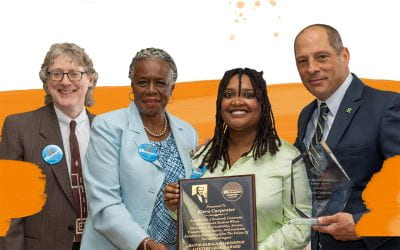A Framework for Change
Social Justice in Actionby Katy Cesarotti
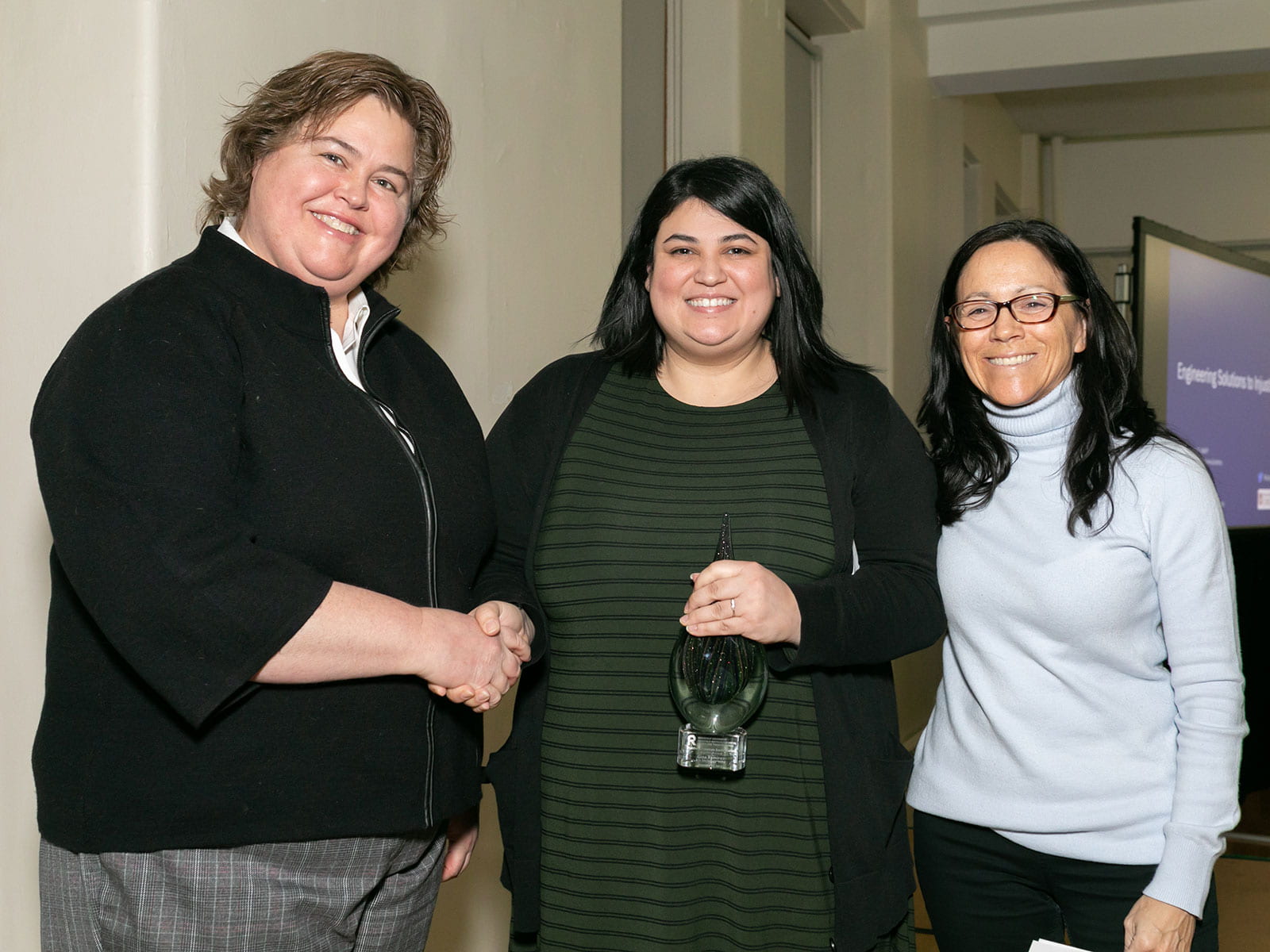
Gina Ramirez; Bonnie Gunzenhauser, dean of the College of Arts and Sciences; and Heather Dalmage, Roosevelt sociology professor
Gina Ramirez (MA Sociology, ’14) had just started graduate school when the piles of petcoke appeared in her neighborhood.
Short for petroleum coke, petcoke is a silty black byproduct of oil refining. It was trucked in from Indiana refineries and stored in uncovered piles on the Southeast Side. Petcoke blew into lawns, playgrounds and homes. Ramirez had to mop every day. She couldn’t leave her windows open without the dust blowing in.
Pregnant with her first child, she worried about the health implications.
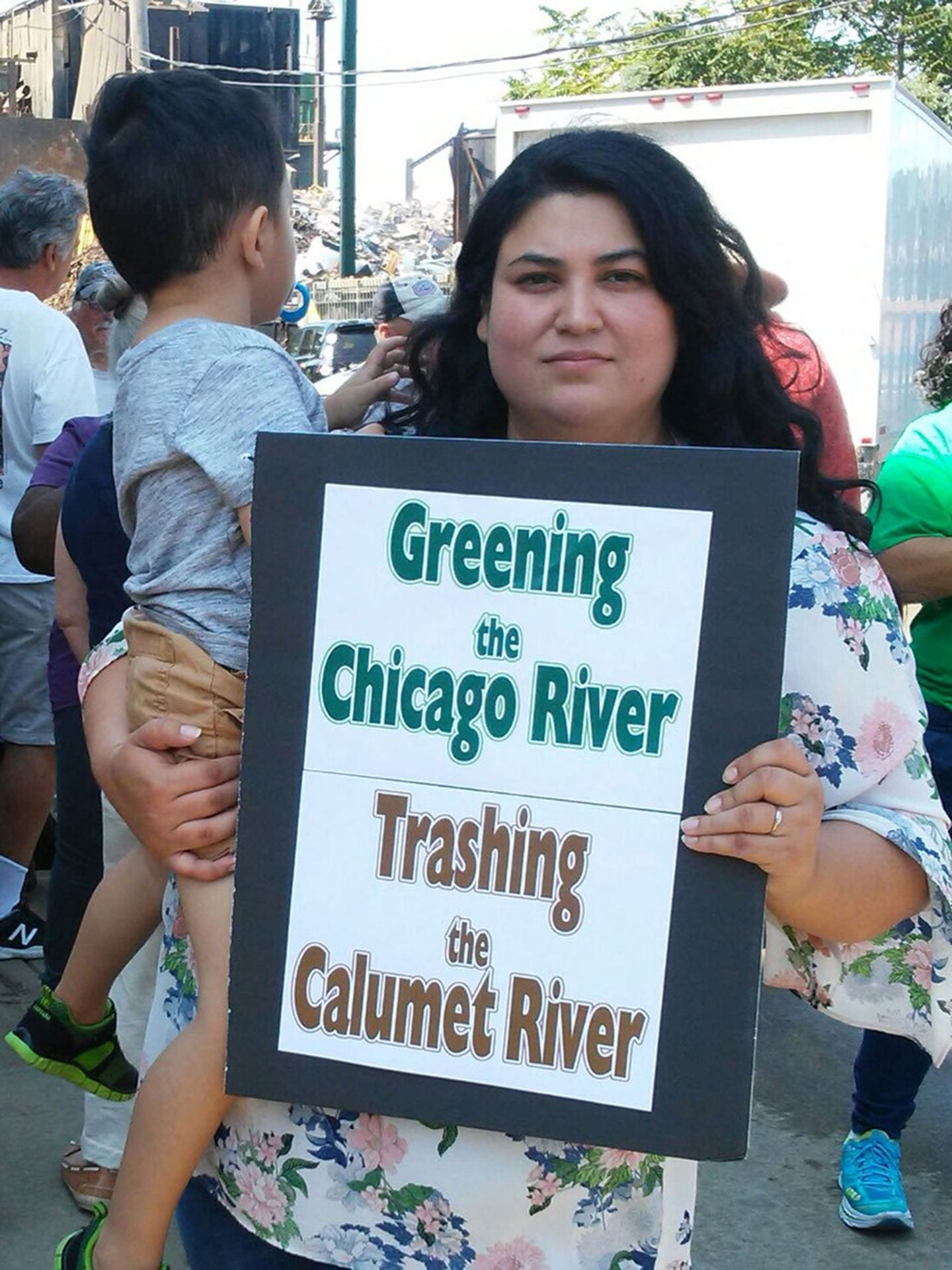
Gina Ramirez and her son, Evan
After working in finance for several years, Ramirez returned to Roosevelt University for her master’s degree. She had always loved her sociology classes, and she wanted to explore a bigger framework for her personal experiences with inequity through poverty and environmental racism. The Roosevelt alumna says she learned to “walk the walk” in Heather Dalmage’s class while volunteering at an Englewood elementary school.
“I felt like I had the right tools to be a better advocate because I understood the systems set up against communities like mine,” Ramirez said. “I had the research to back up what I was anecdotally thinking.”
As co-chair of the Southeast Side Coalition to Ban Petcoke, Ramirez spoke with aldermen and senators, and went door-to-door to tell her neighbors about petcoke. Their protests triggered Environmental Protection Agency investigations and the eventual removal of the petcoke piles.
“This group of mothers and women of color fought the Koch brothers and won,” she said.
Ramirez is the first alum to win the Matthew Freeman Social Justice Award, named in honor of a late Roosevelt student and his commitment to equity. Through the tireless work of award-winners like Ramirez, Freeman’s legacy has touched the lives of hundreds.
“I feel like I’m just doing what I’m supposed to do for my neighborhood, and to be recognized by an institution I respect so much is just amazing,” she said. “I feel like Roosevelt changed my life and the course of my career, enabling me to pursue something I always wanted to do.”
“Roosevelt changed my life and the course of my career, enabling me to pursue something I always wanted to do.”
— Gina Ramirez
(MA Sociology, ’14)
“Take your politics and put them in your shoes”
This October, Richard Wallace (BA Sociology, ’16) won the prestigious Soros Justice Fellowship. With the financial support of Open Society Foundations — a funding package of $127,500 over 18 months — Wallace can dedicate himself full-time to his nonprofit Equity and Transformation (EAT). He joins a cohort that includes advocates like Mariame Kaba and Michelle Alexander, author of The New Jim Crow.
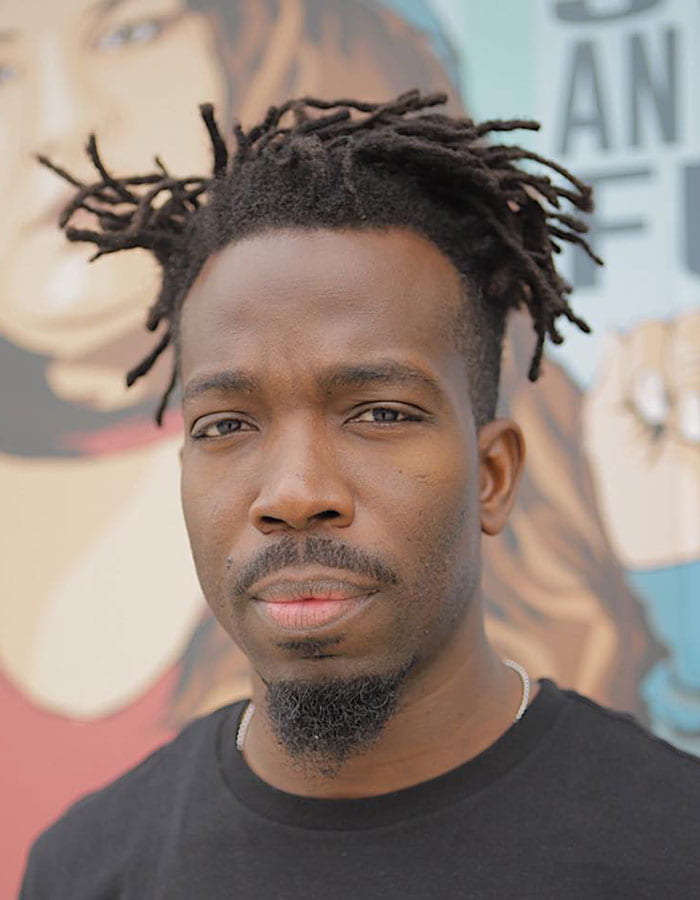
Richard Wallace
But when we spoke, Wallace said one of his proudest accomplishments is still winning the Matthew Freeman award.
“Graduating from Roosevelt set everything in motion,” said Wallace. “The Roosevelt University sociology department prepared me for everything that I’m here for now.”
EAT works primarily in Austin and West Garfield Park, where 80% of young black men are unemployed. “In the United States, you can’t acquire subsistence without capital,” Wallace said. “Simultaneously, that same population has one of the highest rates of unemployment in the nation. So how are these people surviving?”
The answer, confirmed by his extensive research, lies in work outside the protections of the formal labor sector. As EAT describes on its website: “They are childcare providers, the bucket boys that we pass on the way to the train every day, the bootleg DVD man or woman at your local barber shop, the person selling loose cigarettes two for a dollar in front of the local liquor store, the trans- and cisgender commercial sex workers in our community — they are survivors.”
Community organizing was always important to Wallace. His mother, cofounder of Men and Women in Prison Ministries, instilled in him early on the importance of giving back. “She’s the one that told me to take my politics and put them in my shoes,” Wallace said.
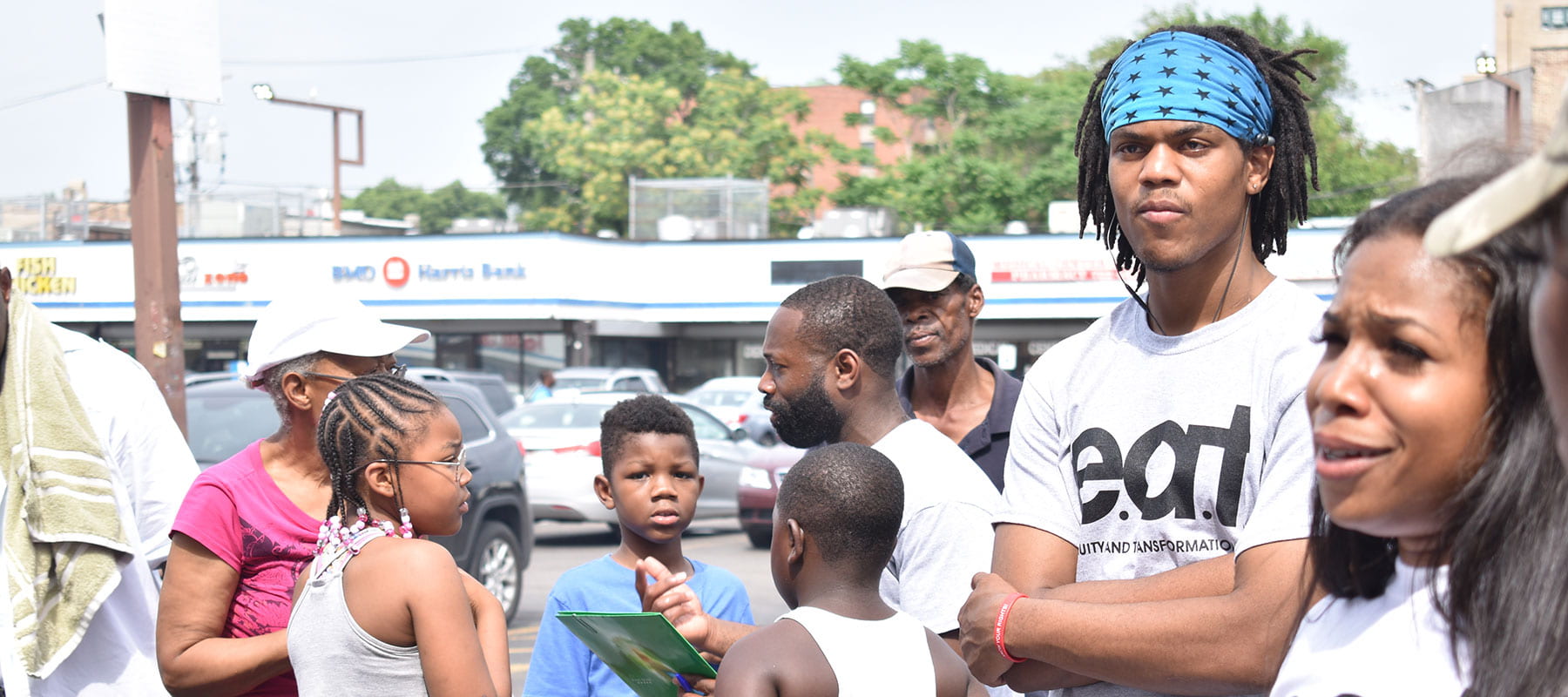
Richard Wallace (BA Sociology, ’16) at an event for his nonprofit organization, Equity and Transformation (EAT).
When Wallace arrived at Roosevelt as an adult, he was looking for tools that would help him share the struggles of his community. Sociology provided a framework to re-examine his own experiences and develop solutions to the inequities he saw.
“I took a Community Organizing class and it just blew my mind,” Wallace said. “I thought we could protest and things changed. It taught me that the protest is part of a strategic campaign, that it’s about consistently pushing the conversation.”
The Roosevelt student was also performing with hip-hop group BBU, earning glowing write-ups for their “political party rap.” BBU’s album Poet, MC was named an Independent Album of the Year by the Chicago Tribune.
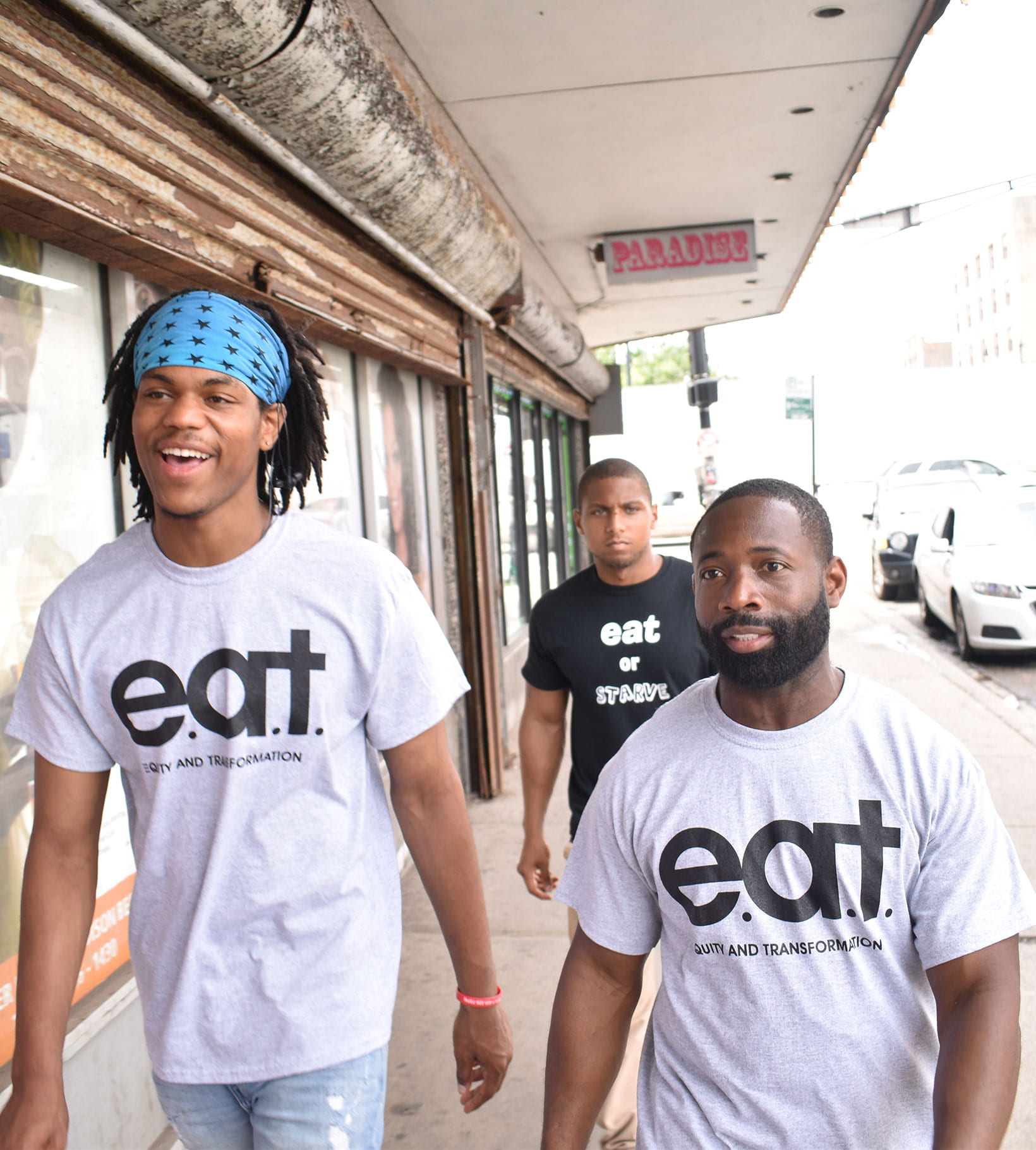
Richard Wallace
“We were organizing before I knew what organizing was,” Wallace said. “We were extremely political and would change the trends.”
While at Roosevelt, Wallace supported the Chicago Workers’ Collaborative and founded the University chapter of the Stop Mass Incarceration Network. In 2015, Bailey nominated Wallace for the Matthew Freeman award. “I’ll say what I rarely say about anyone else: I’ve probably learned as much, if not more, from Richard Wallace as he has learned from me,” Bailey said. “I think he is one of the brightest and best embodiments of the university’s mission that we have seen.”
To Wallace, the recognition was proof positive of his work’s value.
At the time, Wallace was working as a health educator at the West Side Health Authority, with a comfortable salary and a 401k. But the Matthew Freeman award helped him believe in himself as a sociologist. Wallace made the choice to leave his job and commit himself to community organizing.
We have to be as creative as the problems we’re facing, and the only way we can do that is together.”
— Richard Wallace
(BA Sociology, ’16)
The winds of change
Gina Ramirez was nine months pregnant when she received her Roosevelt diploma. Now her son Evan is three, but her fight to protect his future is not over.
Through the Southeast Environmental Task Force, she’s raising awareness about manganese, an industrial byproduct and neurotoxin found in high levels in her neighborhood. The task force has won bans on opening new manganese facilities, but she still campaigns for more health studies, more air monitoring, and remediation.
“It’s a lot of door-knocking,” she says. “It’s a lot of late nights.”
As the Midwest outreach manager at the Natural Resources Defense Council, she advocates for black and brown neighborhoods that have become “sacrifice zones” for industrial pollution. She recently stepped into the role of lobbyist, traveling to Springfield to lobby for the Clean Energy Jobs Act — a policy that would move Illinois toward 100% renewable energy.
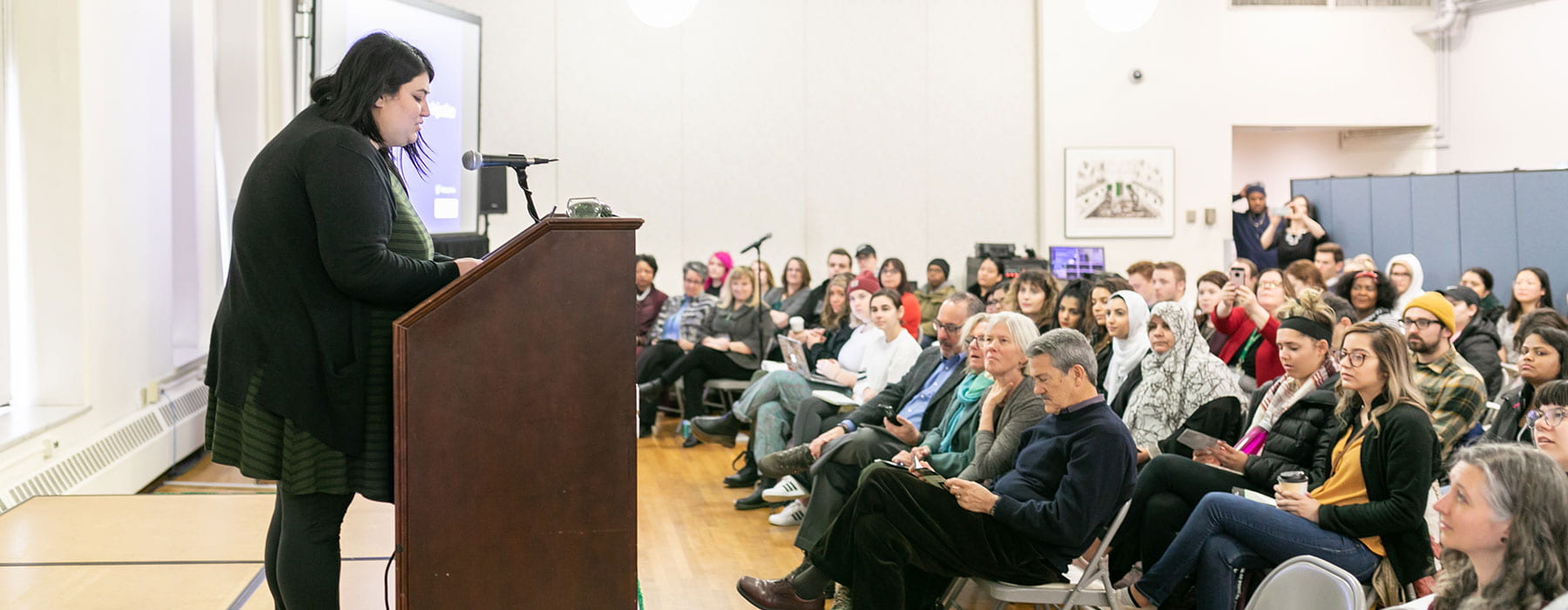
“Voices like mine need to have a seat at the table,” Ramirez said.
This fall, the Roosevelt alumna returned to campus to talk about environmental justice and sociology in action. She told students to ignore the myths about a liberal arts education.
“I want everyone to be inspired to follow their dreams,” she said. “The grassroots organizations I work with — they just created it themselves. Roosevelt gives you the tools to think outside the box and do what’s right.”
Equity and transformation
In 2018, Wallace faced a familiar dilemma.
He was serving as the Illinois campaign director at Jobs to Move America, where he campaigned to bring back 175 union manufacturing jobs to the historic Pullman area. His head was in the work, he said, but his heart was not. He was working mostly with other directors, instead of out in the community.
During that period Wallace was selected as an Atlantic Fellowship for Racial Equity, a program that connects organizers from South Africa and the United States for a global perspective on anti-black racism. The Roosevelt alum had already spent time in the West African country of Benin, where he noticed that the street vendors selling water or prepaid mobile phone cards were treated as a normal, integral part of the economy.
In the United States, Wallace said, “We’re out here vilifying folks who are just trying to eat. And oftentimes it’s a last-ditch effort at subsistence. People are doing what they can to survive.”
He began to imagine a project in Chicago, built and led by the people most affected by economic inequity. He had a choice: stability, or the work he was most passionate about.
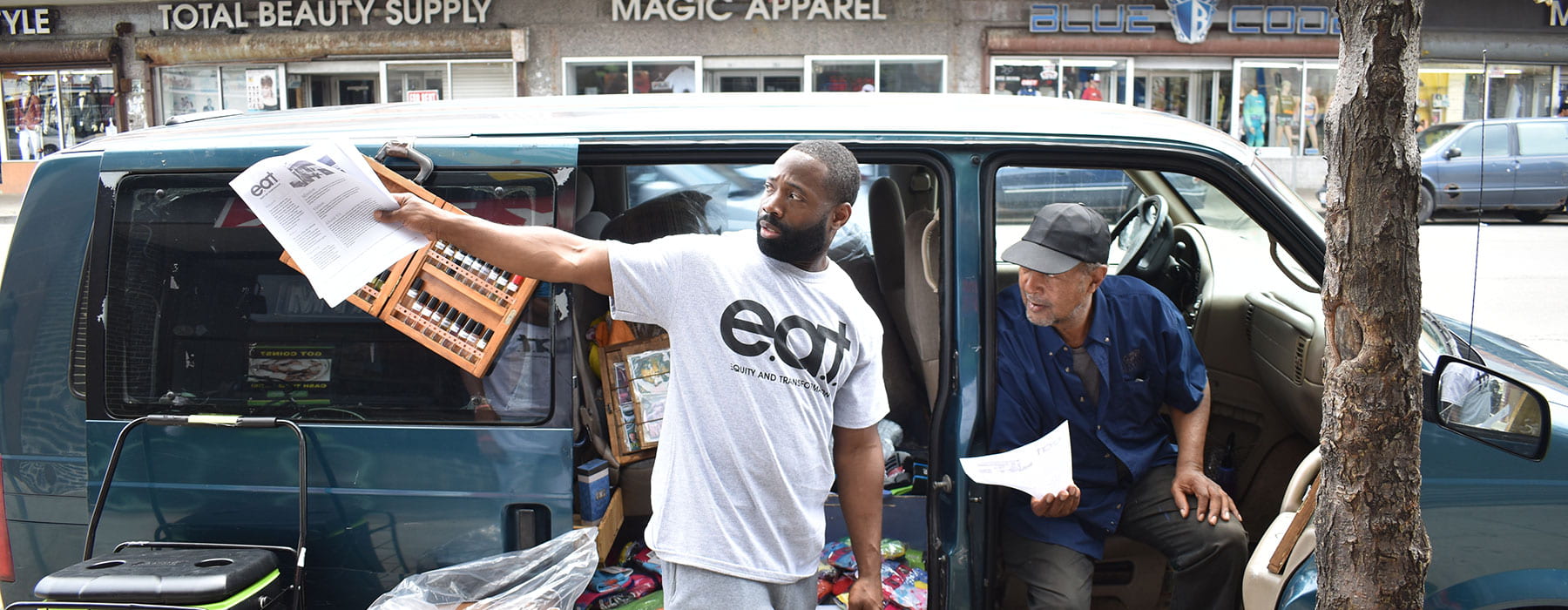
“I left my job — I can tell you it was one of the best jobs I’ve ever had in my life — to build out Equity and Transformation into an actual initiative,” Wallace said.
One of EAT’s first initiatives was cannabis equity. Partnering with the PURE Cannabis Coalition, Wallace’s organization led ballot initiatives to bring economic opportunity to those most affected by the war on drugs. The result, according to Wallace, was “one of the most equity-centric recreational cannabis policies in the nation.” The law will dedicate 25% of tax revenue to reinvesting in affected communities, and could expunge the criminal records of 800,000 Illinoisans.
As a Soros Justice Fellow, Wallace plans to scale out EAT and craft a five-year strategy with insight from his new network. He is determined to shift the conversation around informal workers, continuing the work he began at Roosevelt.
“For me, learning sociology was like cracking the code,” said Wallace. “I had a really intimate relationship with my education, and I hope that folks at Roosevelt now are going there to pursue something that they’re passionate about.”
“For me, learning sociology was like cracking the code. I hope that folks at Roosevelt now are going there to pursue something that they’re passionate about.”
— Richard Wallace
(Sociology, ’16)
More in this section
Opera’s leading role in transforming gender identity in the arts
Lucia Lucas is a force—both on stage and off. In April, Lucia made history during her debut at the Lyric Opera of Chicago as the first openly transgender person to perform there in a leading role.
Deserving of a truly special honor
Friends of Roosevelt recently gathered to recognize Kiera Carpenter, an aspiring environmental professional, as the inaugural recipient of the Mayor Harold Washington Legacy Scholarship.
In and beyond the multicultural classroom
Professor Yue Li helps students to not only recognize and embrace culture differences, but to see social hierarchies that create privilege and oppression.


